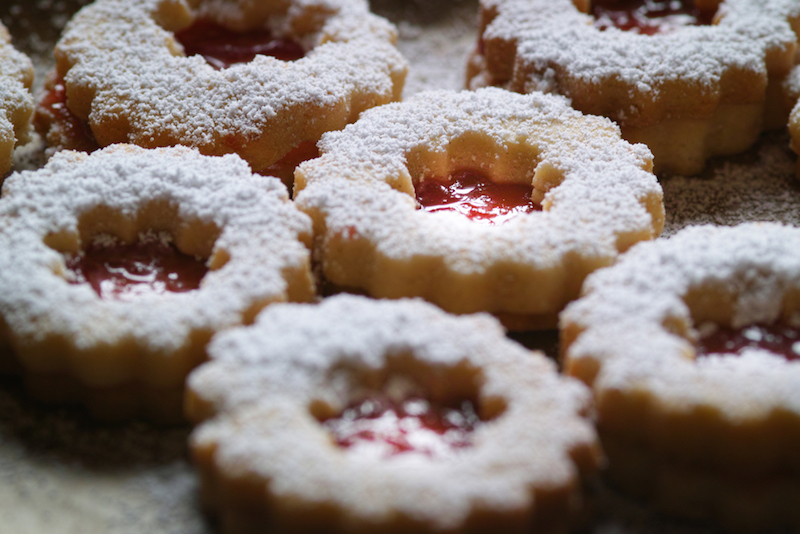9 Hacks for Making Healthier Holiday Cookies

'Tis the season for holiday cookies to be baked or bought — when tins of homemade or store-bought sweets are exchanged at cookie swaps, are given as gifts and appear at workplaces, tempting people with treats all month long.
But dieters beware. When a huge array of holiday cookies is out on display, people do not have just one cookie and feel satisfied, said Libby Mills, a nutrition and cooking coach in Philadelphia and spokeswoman for the Academy of Nutrition and Dietetics. "When there's more than one kind available, people are more apt to try one of each," she said.
Those extra calories can add up to too many, at a time when people are already frequently celebrating around food and beverages, Mills said.
This is a good reason to be smart about the size of cookie that you eat or bake, and to stick with a smaller cookie, said Sara Haas, a dietitian and chef in Chicago and spokeswoman for the Academy of Nutrition and Dietetics. "Moderation is the thing that people forget about around the holidays," she said.
The more additions a cookie has — such as chocolate chips, nuts, fruits, toffee pieces and icing — the more calories it contains, Haas said. A calorie-friendly cookie tends to be plainer, such as a ginger snap or a meringue, she said.
There are ways to make holiday cookies just a tad healthier. Some people may be hesitant at first to modify their traditional holiday cookie recipes, because they've come to trust and enjoy the way the treats taste and don't want to mess with a good thing, Haas said. But others might be willing to experiment a bit to lighten up their cookies or make minor tweaks to them as long as they still taste good, she said.
Here are nine ideas for making holiday cookies a little bit healthier, without skimping on taste or making them unrecognizable as cookies.
Sign up for the Live Science daily newsletter now
Get the world’s most fascinating discoveries delivered straight to your inbox.
Switch the flour.
Making cookies with whole-wheat flour in place of all-purpose (white) flour can improve the fiber content of the cookie about fourfold, Mills said.
But this switch will also make the cookie denser and give it a slightly nutty taste, she noted. So if using all whole-wheat flour feels too extreme, people can go with a half whole-wheat and half all-purpose flour combination in their recipes. This gives the cookies a healthier nutrition profile, but keeps them closer to their original taste, Mills said.
Stores may also carry "finely milled whole-wheat flours," which have the look and feel of all-purpose flour, but are healthier and can be used in place of it in cookie recipes, she said. [Holiday Drinking: How 8 Common Medications Interact with Alcohol]
Amp up nutrition.

Replace some of the all-purpose flour in a recipe with oat flour — by using one-fourth to one-half cup of it — to boost a cookie's soluble fiber content, Mills said.
For an extra dose of healthiness, she also recommended adding 2 to 4 tablespoons of ground-up flax meal (also sold as flaxseed flour)to the dry ingredients. Besides its nutty taste, flax contains beneficial omega-3 fatty acids, which can help reduce inflammation. Flax goes well in fruit thumbprint cookies and in spice cookies, like molasses or gingerbread, Mills told Live Science.
Tinkering with a recipe's ingredients might not always be successful when baking cakes and breads, but cookies are very forgiving, Mills said. In a cookie recipe, the salt can be reduced to a minimum of one-half teaspoon to reduce sodium and still get a flavor enhancement.
Cut some sugar.
Some holiday cookies can be cloyingly sweet, Haas said. But people can use one-quarter to one-third less sugar than called for in a recipe without noticing much difference, she said.
She encouraged bakers to start by using one-fourth less sugar, which Haas said won't mess with the crumb, texture or browning of a cookie. If using one-third less sugar, some taste differences may be noticeable, and people may want to use a sugar substitute that's suitable for baking to make up for some of the sweetness, Haas said.
Another way to cut back on sweetness and calories is to drizzle icing on top of cookies instead of spreading it on thickly, Haas said. And spices such as cinnamon and nutmeg can also evoke sweetness without adding sugar, she said. [5 Experts Answer: Why Is Too Much Sugar Bad for You?]
Swap some fat.

Up to one-half the butter or shortening in a cookie recipe can be replaced with a fruit or vegetable puree, Mills said. Fruit purees that work well include applesauce, or pear, prunes or pumpkin puree, while pureed zucchini or beets are good choices among veggies.
Besides adding flavor, using fruits or vegetables will change the cookie's texture, making it a lot denser and resulting in a chewier cookie instead of a crispy one, Mills said.
Another option is to cut the butter in a recipe by up to one-half and to make up the difference with a nonflavored oil, like canola, soybean, grape-seed or avocado oil, Mills said. She noted that she would not advise this approach for peanut butter cookies.
However, when this method of reducing fat in a cookie is used, the dough might not spread as much during baking as it would if it contained the full amount of fat, Mills said. She suggested that bakers may have to press the cookies down into circles before putting them in the oven.
Make smaller cookies.
Cookies used to be small, but now they've grown in size so people's sense of a normal portion is distorted, Haas said. When baking her own holiday cookies, she keeps them small. "It's a nice way to remind people of a normal cookie portion, and then people can try many different kinds of them," Haas told Live Science.
Use dark chocolate.
Instead of using milk chocolate chips, swap them for dark chocolate, which has a more intense flavor, Mills suggested. Chopping or shaving pieces of dark chocolate from a bar with 70 to 80 percentcacao or cocoa (the label may list the percentage as either cacao or cocoa) [1] can offer more health-promoting antioxidants than can a package of milk chocolate chips, she said.
Cut some ingredients.
To cut back on calories, people can use half the raisins that are called for in a recipe, Mills said. And even though nuts often contain healthy fats, they can be left out of a cookie dough completely or used in much smaller amounts to achieve a nutty taste, she said. [13 Kitchen Changes That Can Help You Lose Weight]
If nuts or dried fruits are omitted from cookie recipes, flavors can be heightened by adding a couple of drops of orange or almond extract, Mills said.
Create DIY fruit fillings.

Although there are plenty of all-fruit or low-sugar fruit fillings sold in supermarkets, it's not that hard to make your own, Haas said. Buy frozen raspberries or dried apricots, for example, and simmer the fruit on the stove with water and a little sugar, she said. Add these fillings to thumbprint or crescent cookies.
Tinker with toppings.
Because people "feast" on cookies with their eyes before they even eat them, Mills suggested lightly brushing the tops of cookies with a little water (or using a spray bottle) and sprinkling a small amount of regular or colored sugar on top. "If people visually see the sugar, and it's the first sensation that hits their tongue, they may not notice if the rest of the cookie is not as sweet," she said. [7 Holiday Stress Busters]
To make a thinner icing that will be closer to a shell coating, Mills suggested mixing a little liquid, such as orange juice, with powdered sugar and drizzling the mixture on top.
Following some of these suggestions is not likely to dramatically change a cookie's flavor, texture or likability, Mills said. Your holiday cookies will still be delicious and not lumps of coal, she said.
Follow Live Science @livescience, Facebook & Google+. Originally published on Live Science.
Cari Nierenberg has been writing about health and wellness topics for online news outlets and print publications for more than two decades. Her work has been published by Live Science, The Washington Post, WebMD, Scientific American, among others. She has a Bachelor of Science degree in nutrition from Cornell University and a Master of Science degree in Nutrition and Communication from Boston University.









